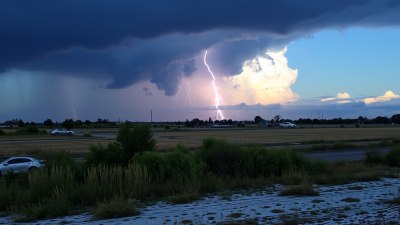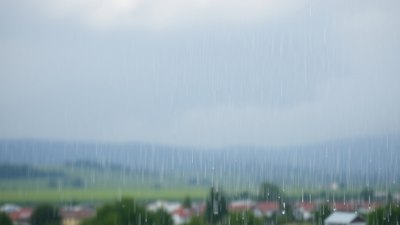Why Is It Hotter the Day After You Put Away Your Fan
Explore the scientific reasons behind the increased heat felt after putting away a fan and how it affects indoor temperatures.

This image was created with the assistance of DALL·E
Many individuals experience a peculiar phenomenon where, after putting away their fans, they notice an increase in temperature. This sensation isn't merely a figment of their imagination but is grounded in both physics and the psychological aspects of heat perception. When fans are removed or stored away, a myriad of factors come into play that can elevate the perception of heat and actually contribute to a warmer environment inside the home. Let's delve into the reasons behind this sensation in detail.
The Role of Air Circulation
Fans function primarily to circulate air and provide a cooling effect. When a fan operates, it creates a breeze that evaporates sweat on the skin, making us feel cooler than the ambient temperature suggests. By removing the fan, the effective cooling mechanism is taken away, and we are left with stagnant air. Without any airflow, sweat cannot evaporate as efficiently, leading to a feeling of increased warmth. This principle is related to the evaporative cooling effect, which is the natural process by which heat is removed through the evaporation of sweat.
The Psychological Aspect of Heat Perception
Interestingly, our perception of heat can be influenced heavily by our psychological state and expectations. If you consciously decide to put away a fan, you may mentally prepare for the temperature to feel warmer. This expectation can amplify your sensitivity to warmth. This psychological phenomenon can create an illusion of increased temperature, which can be exacerbated by your body's adaptation mechanisms. When accustomed to cooler air stimulated by the fan, it's easy to feel the contrast keenly when it’s turned off or stored away.
Heat Retention of Your Living Space
Most homes retain heat during the day due to various materials used in construction. Walls, floors, and ceilings can absorb heat and release it in the evening when temperatures cool off. However, if these materials don't have the benefit of airflow from a fan, the heat can become trapped in the space, leading to an increase in temperature indoors. Once the fan is turned off or removed, the stagnant air becomes warmer as it circulates less effectively. This can make a home feel significantly hotter, particularly if the outside temperature is elevated.
Humidity Levels and Thermal Comfort
Humidity plays a crucial role in how we perceive temperature. High humidity levels mean that there is a lot of moisture in the air. With a fan in operation, the airflow helps to reduce the perceived humidity by facilitating evaporation. Once the fan is gone, humidity levels remain high, and sweat has a harder time evaporating off your skin. This leads not only to discomfort but can also cause the distinct feeling of increased heat. It’s important to note that the relationship between humidity and the heat index, which factors in both temperature and humidity, can make days feel even hotter. This combination may explain why you feel overheated after removing a fan.
Using Fans During Different Times of Day
Another critical factor is the timing of your fan usage. Fans are typically more effective in the evening or during hot days. In the evening, after the sun sets, temperatures drop and the air cools. Using a fan wisely can help extend this cooling benefit into the night. However, if you rely on the fan during the day and remove it at night, the indirect result might be a swelteringly hot environment the following morning. Since you have now disrupted the airflow and the cooling acquired from the fan the previous day, this leads to feelings of greater heat upon awakening. This error in fan usage can contribute to a cycle of discomfort, particularly within hot climates.
Smart Alternatives to Fans
If you find yourself feeling hotter after storing your fan, consider exploring alternative cooling methods. Air conditioning, if available, provides a consistent cooling effect that generally controls both temperature and humidity. In regions where air conditioning is not accessible or practical, consider utilizing cross-ventilation by opening windows to allow a natural flow of air through your living space. Additionally, implementing cooling practices like placing ice or cold water in front of an operational fan, utilizing damp cloths on the forehead, and wearing light, breathable clothing can enhance comfort levels immensely during peak heat times. Storing the fan is not the sole answer to managing heat effectively.
The Impacts of Seasonal Changes
Seasons greatly influence temperature in any given area. When transitioning from cooler seasons into summer, homes have been closed off to save heat, sometimes resulting in increased indoor pollutants and an inability to release built-up heat adequately. Fans can assist in not only cooling but also in enhancing indoor air quality by circulating fresh air during these transitional phases. Therefore, the removal of a fan during a season shift can leave your home feeling much warmer than one equipped with proper circulation methods. It’s essential to manage seasonal transitions effectively while maintaining airflow to combat residual heat.
In conclusion, feeling hotter after putting away your fan is influenced by multiple factors— airflow disruption, psychological perceptions, humidity levels, and the natural thermal properties of your home. Addressing the ways in which these elements interact can help mitigate the sensation of heat through better temperature management. Exploring alternatives for airflow and being conscious of how we use fans can significantly alter our experiences with indoor climate. As summer approaches or as heat waves strike, recognizing the dynamics of heat perception can lead to more comfortable living conditions and an increased sense of well-being.











